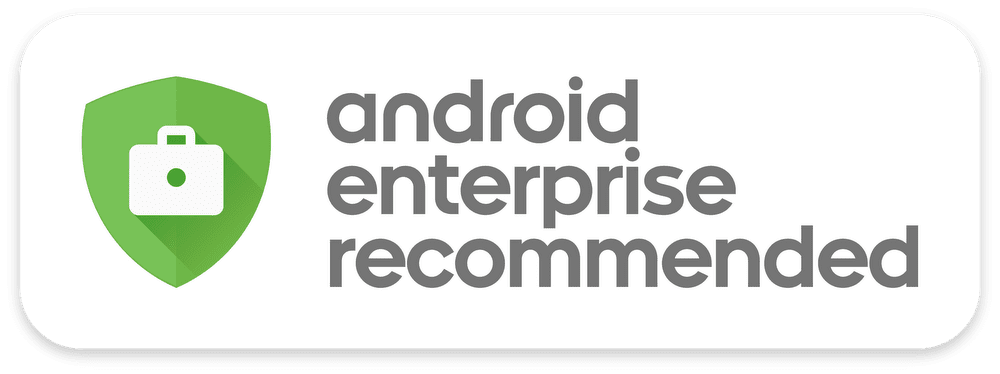
Google announced the Android Enterprise Recommended program today, designed to help enterprises find the best enterprise devices and services Android has to offer.
As the name implies, it’s designed to point enterprise IT departments at devices that Google has deemed to be enterprise-ready. This involves a number of criteria, including minimum hardware specifications for Android 7.0 + devices, support for bulk deployment and managed profiles and devices for a consistent application experience across deployed devices.
To be Android Enterprise Recommended, a handset has to adhere to a strict set of rules.
It must run Android 7.0 Nougat or later, offer zero-touch enrollment with bulk deployment to employees, get the latest security patches within 90 days of their release for a minimum of three years, be available unlocked, and offer a consistent app experience in managed profiles and on managed devices.
Furthermore, it must come with a minimum of 2GB of RAM and 32GB of storage, a 1.4 GHz processor, 8+ hours of active battery life, a 10 MP main camera and 2 MP selfie shooter, and be updated to at least one major new Android version.
According to Google,
Android Enterprise Recommended simplifies the selection process so you can start your search with a shortlist of approved devices and services. Select from a curated list of verified devices and services that meet elevated enterprise requirements from partners trained and supported by Google.
Google state that with each new Android platform release, they will update the Android Enterprise Recommended program requirements.
The list includes all of the minimum app and hardware specifications required to be included in the program.
Minimum specifications for devices, carrier services and enterprise mobility management services
Operating system
Minimum OS versionAndroid 7.0+
Minimum device specifications
RAM 2 GB
Storage 32 GB
Speed 1.4GHz
Battery life 8+ hours (active)
Camera (front / rear)2MP / 10MP
Architecture 64-bit
Bulk device enrollment
Enrollment methods
- QR code
- Zero-touch enrollment (Required for Android 8.0 devices)
UI/UX
Default Systems Apps – work profile
- Contacts
- Downloads
- Play Store
- EMM app (if bundled in the system image)
Default Systems Apps – managed devices
- Camera
- Contacts
- Downloads
- Messaging
- Dialer
- Play Store
- Settings
- EMM app (if bundled in the system image)
Other apps
- Contacts
- Dialer
- Settings, etc.
Standard AOSP icons and strings
- Use standard branding and strings
Provisioning workflow requirements
- Managed devices
- Work profile
- Enrollment
Services
Security update support 90-day security updates
Major update release support Support current shipping release + one letter upgrade
Unlocked device availability Unlocked device must be available for purchase by enterprise customers through either:
- A 3rd-party distributor
- Direct from manufacturer
The program also requires that within 90 days of Google releasing them manufacturers make security updates available for at least three years. Ninety days feels a bit long if there is a serious vulnerability in the wild, but Google indicated this was not a fixed list and the company would update the requirements as needed over time.
Devices
As for the devices, the following are recommended:
- BlackBerry KEYone and Motion
- Google Pixel, Pixel XL, Pixel 2 and Pixel 2 XL
- Huawei Mate 10, Mate 10 Pro, P10, P10 Plus, P10 Lite and P smart
- LG V30 and G6
- Moto X4 and Z2 Force Edition
- Nokia 8
- Sony Xperia XA2, XA2 Ultra, Xperia XZ Premium, Xperia XZ1 and Xperia Xperia XZ1 Compact
Conspicuously missing from this list is anything by Samsung, a company that has programs in place like Knox specifically designed for the enterprise. Samsung’s exclusion is probably an artefact of the stringent list of qualities a handset must possess to earn Google’s seal of approval, among them offering Google Play as the default app store. Many Samsung devices include an app for the company’s own app store.
There are also no HTC phones included. However, Google state that more devices will be added,
You can expect more Android Enterprise Recommended devices to be added in the coming weeks and months. Throughout 2018, we will also be applying the Android Enterprise Recommended framework to additional partner types, including OEMs of “dedicated” and rugged devices, mobile carriers, enterprise mobility management (EMM) providers and systems integrators.
The Enterprise program has also named approved carriers capable of delivering zero-touch enrolment, namely SoftBank, AT&T, Deutsche Telekom, Verizon and BT. 32 enterprise mobility management vendors have been approved under the program.


